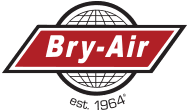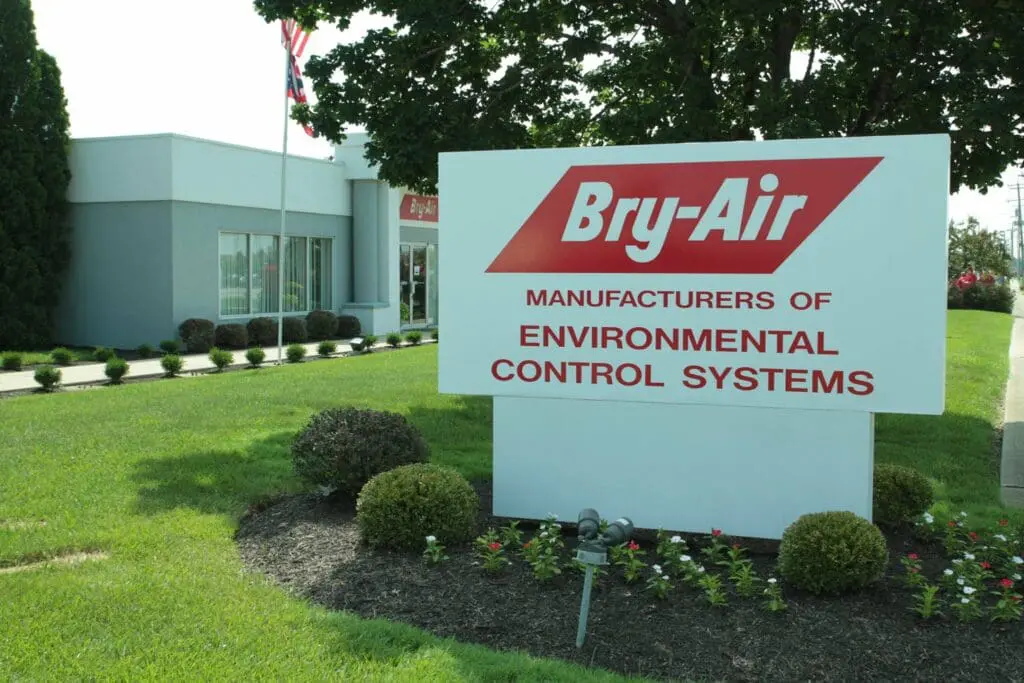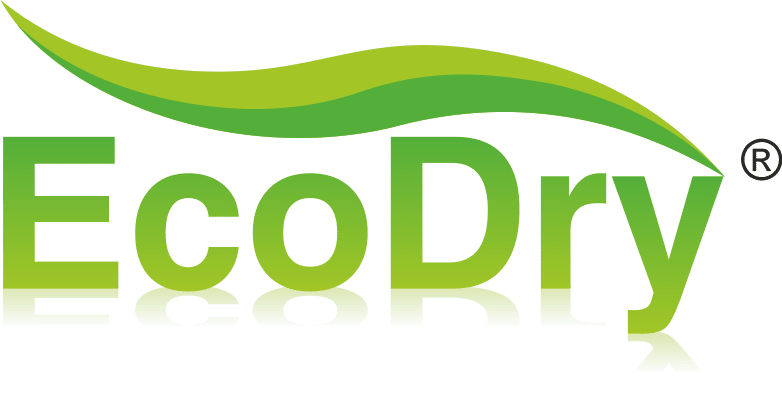What is Dehumidification?
Dehumidification is to remove moisture from the air or a gas.
There are many types of dehumidifiers all with their positives and negatives. It is important to consider these positives and negatives to properly apply a dehumidifier to a space or process. The primary types of dehumidification are as follows:
- Compression
- Mechanical/Refrigeration
- Adsorption Based Desiccants
Commercial and Industrial Dehumidifier Systems
To better understand the process of dehumidification it is important to understand the various types of dehumidification systems on the market today. All of the basic dehumidification types identified above are available but this does not mean that all types are created equal for each particular application.
Some of the best systems available today offer a combination of system technologies such as refrigeration coupled with adsorption, as often used by Bry-Air. Contact Bry-Air today to discuss these systems and how they may be applied to your specific moisture control challenge.
Commercial and Industrial Dehumidifier Applications
Warehouses and Storage Facilities
Commercial and industrial dehumidifiers are essential in warehouses and storage facilities to prevent moisture damage to goods and products. Excess humidity can lead to mold growth, corrosion, and degradation of materials. Dehumidifiers help maintain optimal humidity levels, ensuring the longevity and quality of stored items.
Manufacturing Plants
Manufacturing plants often have high humidity levels due to the use of water in various processes. Excessive moisture can negatively impact production lines and machinery, leading to malfunctions and downtime. Dehumidifiers control humidity levels, preventing condensation and protecting equipment from moisture-related issues.
Food Processing Facilities
In food processing facilities, maintaining proper humidity levels is crucial to ensure product safety and quality. High humidity can promote bacterial growth and spoilage, while low humidity can cause food products to dry out. Dehumidifiers help regulate moisture levels, creating a hygienic environment and extending the shelf life of food products.
Indoor Swimming Pools and Spas
Indoor swimming pools and spas are prone to high humidity due to the evaporation of water. Excessive moisture can lead to condensation on windows, walls, and ceilings, causing structural damage and creating a breeding ground for mold and mildew. Dehumidifiers remove excess moisture from the air, preventing these issues and maintaining a comfortable environment for swimmers.
Data Centers
Data centers house sensitive electronic equipment that generates heat. To prevent damage to the equipment and ensure efficient operation, these facilities require precise control of humidity levels. Dehumidifiers help maintain the optimal humidity range, reducing the risk of electrical failures and equipment malfunctions.
Museums and Archives
Museums and archives need to maintain stable humidity levels to preserve valuable artifacts, documents, and artwork. Fluctuations in humidity can cause irreversible damage, such as warping, cracking, or fading. Dehumidifiers help regulate humidity, protecting these precious items and preserving their integrity for future generations.
Greenhouses and Indoor Farms
In greenhouses and indoor farms, controlling humidity is crucial for plant growth and disease prevention. High humidity can lead to fungal infections and poor plant health, while low humidity can cause wilting and dehydration. Dehumidifiers create an optimal growing environment by maintaining the right moisture levels, promoting healthy plant growth and maximizing crop yields.
Dehumidification Benefits for Industrial Applications
1. Improved Product Quality
Dehumidification in industrial applications can help maintain consistent humidity levels, which is crucial for industries such as food processing, pharmaceuticals, and electronics. By controlling humidity, products are less likely to spoil, degrade, or suffer from moisture-related damage, resulting in higher quality end-products.
2. Increased Efficiency
Excessive humidity in industrial settings can lead to condensation on equipment and surfaces, causing corrosion, mold growth, and decreased efficiency. Dehumidification helps prevent these issues, ensuring that machinery and surfaces remain dry and in optimal working condition, thereby increasing overall productivity.
3. Energy Savings
High humidity levels can make air conditioning systems work harder to maintain comfortable temperatures, leading to increased energy consumption and higher utility bills. By dehumidifying the air, industrial facilities can reduce the load on their HVAC systems, resulting in significant energy savings.
4. Mold and Bacteria Prevention
Moisture-laden environments provide the perfect breeding ground for mold and bacteria, which can pose serious health risks and contaminate products. Dehumidification helps inhibit the growth of these microorganisms, creating a healthier and safer working environment for employees and ensuring product integrity.
5. Reduced Maintenance Costs
Excessive moisture can cause damage to equipment, leading to costly repairs or replacements. By controlling humidity levels, dehumidification helps extend the lifespan of machinery and reduces the frequency of maintenance, saving industrial facilities money in the long run.
6. Improved Worker Comfort
High humidity levels can make working conditions uncomfortable for employees, leading to decreased productivity and morale. Dehumidification helps create a more comfortable and pleasant working environment, promoting employee well-being and enhancing overall job satisfaction.
7. Compliance with Regulations
Certain industries, such as pharmaceuticals and electronics, have strict humidity requirements to comply with regulatory standards. Dehumidification ensures that these industries meet the necessary guidelines, preventing any potential legal or regulatory issues.
Overall, dehumidification offers numerous benefits for industrial applications, including improved product quality, increased efficiency, energy savings, mold and bacteria prevention, reduced maintenance costs, enhanced worker comfort, and compliance with regulations. Investing in a reliable dehumidification system can help industrial facilities optimize their operations and achieve long-term success.
Additional Dehumidification Resources provided by Bry-Air:
- Bry-Air Products
- Commercial Dehumidifiers and Industrial Dehumidifiers
- Dehumidifier Repair Services: How To Fix
- Desiccant Dehumidifiers
- Lab Testing










